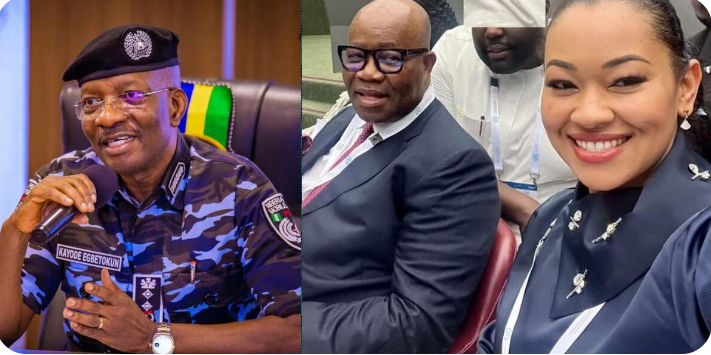
Senator Natasha Fights Back: Tells IGP to Dismiss Akpabio's 'Bubble Petition'

The tension between the corridors of power and Nigeria’s security apparatus took a dramatic twist as suspended senator, Natasha Akpoti-Uduaghan, fired back at Senate President Godswill Akpabio over what she described as a desperate attempt to derail an investigation into an alleged assassination plot against her. In a bold move that is already stirring political circles and dominating online discourse, Akpoti-Uduaghan has called on the Inspector General of Police, Kayode Egbetokun, to dismiss a petition filed by Akpabio accusing her of criminal defamation and incitement.
Instead of entertaining what she labels a “diversionary” effort, the Kogi-born senator is demanding a full-scale probe into her allegations that the Senate President orchestrated a plot to harm her. According to a statement released through her legal counsel, Victor Giwa, Natasha is not only standing her ground but turning the spotlight back on Akpabio, declaring him a “principal suspect” in a life-threatening case that is beginning to read like a political thriller.
The saga first exploded when Akpoti-Uduaghan accused Akpabio of being behind a sinister plan to eliminate her—an accusation that Akpabio swiftly denied in a petition to the IGP. He described the claims as “heinous lies” designed to tarnish his image and incite unrest. But Akpoti-Uduaghan isn’t backing down. In fact, she’s doubling down, alleging that Akpabio’s petition is nothing more than an attempt to preemptively shield himself from a serious investigation.
“It is our client’s position that the Senate President should submit himself for a full investigation before raising any allegations of incitement,” the statement read. Strong words, especially considering the stakes. The senator went further to claim that her security details were illegally withdrawn—an action she believes was orchestrated by the Senate President to leave her exposed and vulnerable.
This is no longer just a spat between political rivals; it’s becoming a national concern with potential legal and security implications. Akpoti-Uduaghan is adamant that the IGP should not be distracted by what she termed a “bubble petition”—a term her legal team used to describe a flimsy and politically motivated maneuver aimed at derailing justice. “The petition filed by Akpabio is diversionary and prejudicial to ongoing investigations,” her legal team asserted, urging the police chief to treat it as such.
While political drama is nothing new in Nigeria, this particular confrontation has struck a chord with many observers. On one side is a suspended senator making chilling claims of a death plot, with alleged links to one of the highest-ranking lawmakers in the country. On the other, the Senate President himself, fiercely denying the allegations and countering with a criminal complaint of his own. The IGP, now caught in the middle, faces mounting pressure to act with fairness, transparency, and urgency.
The timing of the scandal is also critical. With political fault lines deepening ahead of the next electoral cycle, every action—or inaction—by institutions like the Nigeria Police Force will be heavily scrutinized. There are also broader implications for the Senate as a body. If a senator’s claims of threats to her life, allegedly masterminded by the Senate President, are not thoroughly investigated, what does that mean for the integrity and safety of lawmakers, especially outspoken ones?
Public reaction has been swift and divided. On social media, many Nigerians are voicing support for Akpoti-Uduaghan, praising her courage to speak up in the face of alleged intimidation. Others have expressed skepticism, questioning the timing of the accusations and whether they are rooted in personal vendettas or political ambition. Still, there’s a unanimous call for the truth—whatever it may be—to come to light through an impartial investigation.
For Natasha Akpoti-Uduaghan, this isn’t her first run-in with political controversy. Known for her fiery rhetoric, progressive views, and refusal to be sidelined in male-dominated political arenas, she has become somewhat of a lightning rod in Nigerian politics. Her suspension from the Senate remains a sore point for her supporters, many of whom see her current clash with Akpabio as part of a broader effort to silence a dissenting voice.
Akpabio, on the other hand, has his own share of loyalists and a reputation for political resilience. His swift legal response to Natasha’s claims shows he is not taking the allegations lightly, and is ready to use every tool available to defend his name and position.
But the bigger issue is no longer just about Natasha versus Akpabio. It is now about whether Nigeria’s justice and law enforcement systems can rise above the smoke of political power plays to deliver clarity and justice. Will the police launch an unbiased investigation into the claims of a sitting Senate President being linked to an assassination plot? Or will the matter fade quietly under the weight of bureaucracy, influence, and public fatigue?
As the situation continues to unfold, all eyes remain on IGP Kayode Egbetokun. His next move could set the tone for how seriously such allegations are taken in Nigeria’s democratic space. For now, the public awaits answers—and Senator Natasha Akpoti-Uduaghan is making it clear she won’t rest until she gets them.


